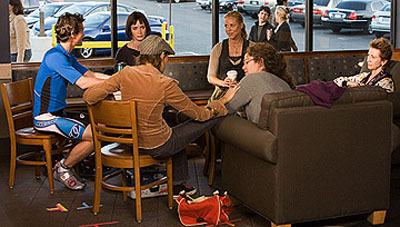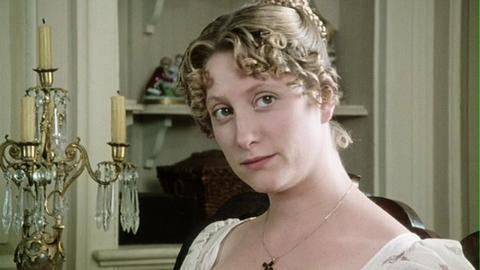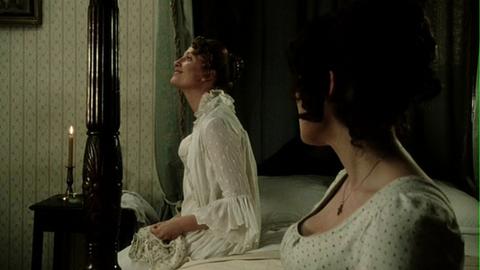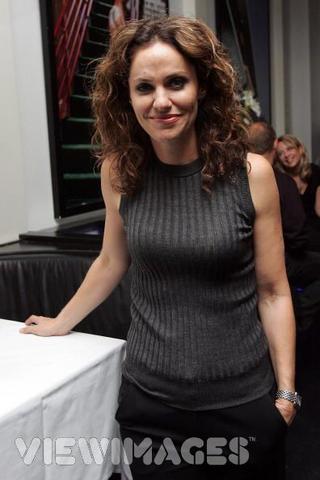Ellen and Jim Have a Blog, Too
We are two part-time academics. Ellen teaches in the English department and Jim in the IT program at George Mason University.


When Austen's words & works entered my life -- & on Jane Bennet · 24 November 07
Dear Miss Vane,
On Austen-l one of the new people asked the question, “How did the works & words of Jane Austen enter your life?”
After some of the long-time members responded, I retold what I had written after first getting onto Austen-l:
I first read Pride and Prejudice when I was 12. It was one of a set of “classic” novels my father owned in inexpensive sets of books that used to be published by do-gooders. I loved it. I saw that the parents in the novel were like mine, softer and pastoralized (I wouldn’t have used that second word); it was a revelation and comfort to see truths about marriage out there. I also loved the wit, and reread the novel many times for the funny scenes.
Then I read Sense & Sensibility. I may have been 13. I have in a sense never stopped reading it. Elinor Dashwood as a conception and presence (out of Austen) became interwoven with my being and as mores or norms I’d like to come up to for safety—the way because I too have a hard time crossing thresholds, opening doors, Fanny Price became interwoven with my life when at 15 I read MP. Mansfield Park gripped me, and I remember thinking to myself “What a strong book.” When I finished it, I turned back to the first page and read again. I found a paperback copy of MP in a local drugstore: in those days (the early 1960s), there were no large chain bookstores in all the suburbs of NYC. My copy had a blurb which described the book as “rollicking.” I realized the blurb was jarringly wrong. Well, MP has never been far from my mind since; it linger, easy to call up even if I cannot (like Miss Schuster-Slatt quote whole passages with ease and find where they are).
Northanger Abbey and Persuasion became part of my consciousness during the time I cannot remember very well, ages 17 to 19. I don’t remember the first time I read these sister novels, and know only that I had read them by age 21, when Emma was assigned in school. I knew that the only novel by Austen I had left—I only knew of the six realistic finished novels at that time—was Emma. I’m very fond of Northanger Abbey: I love its gothicism and was supremely happy the day I climbed to Beechen Hill and, breathless, thought to (but did not) reject the whole City of Bath as unworthy to make part of a (picturesque) picture. At age 33 when I ended up in an intensive care unit in a hospital, Jim brought me a copy of Persuasion to get me through. (About 10 years later my father brought me Trollope’s The Vicar of Bullhampton when I ended up in Metropolitan Hospital after a bad car accident.)
It took me time to appreciate Emma. The scene where Emma insults Miss Bates was so painful. At the time I understood myself to be feeling for Miss Bates; since then I realize the pain I feel is for Emma when Mr Knightley reproaches her with such distress, and that it’s embedded in how Jane Fairfax is made to feel by Frank Churchill’s cruelty & Emma’s callous arrogance, and in the ‘72 Emma I’m reminded of Mrs Elton’s grating officious attempt to send her off to where she will know emotional torture. A wretched business is not an adequate phrase for it all. I also disliked Emma. Now I think Emma and MP are the most aesthetically satisfying in the sense of endlessly rich, suggesting new thoughts and interpretations, new whole stories and reaches of experiences hinted at in the surface ironic text each time I reread.
I don’t remember when I first read Austen’s juvenilia, only it was sometime in my 20s (in graduate school) & that I thought the jokes so funny I remembered some of them for years after. The woman who at 55 thinks herself still in danger of “dreadful” male aggression. The heroines who not knowing what to do, did what they could and fainted alternatively on the couch. I was kept in a continual titter at this book written a couple of hundred of years ago by a young girl who had (apparently) read similar cliched books and listened to similar sentimental nonsense that I had. I had never heard of (or somehow did not pay attention to citiations of) her unfinished novels, Catherine, or The Bower, The Watsons, Lady Susan or Sanditon until I got onto Austen-l in my late 40s. So I read them then and her letters, which at first I was startled by & disliked. The Watsons is powerful even in its fragmentary state, and the statement at the end provided by Cassandra (Austen’s sister) shows it would develop a patterned story like those of the other 6 novels. Lady Susan is hard cold novel in the mode of Les Liasions Dangereuses. Catherine is a young girl’s early try (with some interesting autobiographical give-aways); Sanditon is too fragmentary to see what would evolve eventually. The biography I knew well by my mid-30s was Elizabeth Jenkins’s. I think Claire Tomalin’s is basically an update of Jenkins’s portrait.
I’ve decided to retell this as I think I have not yet told you how I came to Austen. I also have not for a long time written about one of the Austen movies in any direct way. I don’t want to because it takes time and the initial writing about quite a number I have put into blog-letters. However, I have been over the past couple of months been spending much of my days reading Austen’s Emma and now her Pride and Prejudice and watching with close attention, taking notes, grabbing snapshots of 3 faithful films, the ‘72 Emma, ‘79 P&P, and ‘95 P&P. I did rewatch the Meridian/A&E ‘96 Emma by Andrew Davies a couple of weeks ago, and may try an initial posting on it soon as it is one of those I have not written about on this blog with any care.
My interest in and liking for The Jane Austen Book Club is a direct result of my long years of love for Austen, and watching the Jane Austen movies had led me to want to try to write a sequel. The movie-makers take the types in Austen (who are partly the result of the circumstances and mores of the time and therefore no longer exist in the form she presents them) and make them understandable, variants of what we know today.

The group meeting at a Starbuck’s (Jane Austen Book Club, 2007)
What I’ve seen in these makes me hope I too could write a successful one, not in the comic vein of Karen Joy Fowler or Robin Swicord, but in my own ironic emotional one. Since reading Bridget Jones’s Diary (book & films), I’ve wanted to write a series of short stories on the secondary and minor woman. Today I was terribly moved by the way Susannah Harker plays Jane in the 1995 A&E/BBC P&P I feel I want to have her acting acknowledged and what Jane Bennet really is in Austen’s text too.
In Austen, we discover Jane best in her dialogues or debates with Elizabeth. In these she repeatedly understands, takes all Elizabeth’s points, and says that she choses not to interpret things as Elizabeth does because such interpretations would make her too disquieted; life would become too hard, too disturbing and she prefers to stress what is most humane in each situation. Why? Unless she were to do this, it would be difficult for her to carry on (as in her speech “Do not distress me…” Ch 24 or Vol II, Ch 1, Oxford 137).
Elizabeth has more resilience (as in her attempts to shield Jane from the unfeeling Mrs Bennet by repeating the same arguments over and over again, though of course to no avail); but Jane’s strong feelings do not blind her. Among the ironies of Jane Bennet’s ordeal in the book—and like Jane Fairfax hers is an ordeal in the margins—is that her placid surface is responsible for Darcy underestimating her emotions and understanding, but under the placidity is a heart as tremulous as Fanny Price’s.

Susannah Harker as Jane Bennet listening to her mother’s grating laments about ther loss of Bingley and her father’s jokes about how every girl needs to be jilted and Wickham would jilt Elizabeth creditably
Jane is also brought forward to us through her responses to Elizabeth’s descriptions of Charlotte. Jane defends Charlotte’s decision to marry Collins. But not—not—from the point of view of the mercenary or worldly nature of her choice; rather she prefers to stress the probable compatibility of the couple and hopes they will be personally happy together. If we look at what she has to say, we discover she (like a number of the characters in P&P) has the same disillusioned appreciation of the pettiness, vanity, and cold selfishness of people that drives Charlotte’s decisions. It is Elizabeth who is astonished not Jane.
Jane also seems to know that when things go wrong it is probably incompetence or indifference not conspiracy. For example, Elizabeth sees a plot afoot against Jane, and is even willing to think maybe even Bingley could have been coolly using Jane (Jane: ‘Women fancy admiration means more than it does.’ Elizabeth: ‘And men take care that they should.’). But Jane’s response is not to deny that Miss Bingley and Co could be plotting against her; rather that
‘If it is designedly done, they cannot be justified; but I have no idea of there being so much design in the world as some persons imagine’ (Oxford 136).
This is not a consoling view. Jane is pointing to the lack of motive people have for doing what they do, though not the groundlessness of most decisions (that’s Charlotte’s yet more disillusioned view, i.e., that we cannot have sufficient grounds for action and most people therefore accept this and act without them—without thinking about this of course). In an early chapter one of Jane’s arguments against Elizabeth’s view of Miss Bingley’s character is first that Caroline “is incapable of wilfully deceiving anyone” (we discover this to be wrong: Caroline and Darcy lie to Bingley about Jane’s presence in London); but then falling away from this, that maybe “she is deceived herself.” There’s not a lot of comfort in think someone is a fool rather than a knave. So Elizabeth’s response that Jane has now done her duty by Caroline is wry, and Jane then moves to another position:
‘But, my dear sister, can I be happy, even supposing the best, in accepting a man whose sisters and friends are all wishing him to marry elsewhere’ (Oxford 119).
Jane is often read as a complacent optimist. Complacency is not what beats in her heart. It is rather a deep plangent feeling about integrity as the only safety or believing in it as the only peace. The one she is most opposite to in all Austen’s fiction is I would say Mary Crawford whose concerns are rank and wealthy until the end of the book when her permanent residence with her sister, Mrs Grant, signals some change of heart. I always remember how Mary Crawford is surprised that her friend, having carefully vetted her future husband for fashion and fortune, should find him ‘vicious’ and an unpleasant life partner.” Jane Bennet would never make such a mistake.

Susannah Harker as Jane Bennet remembering Mr Bingley (“I may remember him as the most aimable man of my acquaintance”)
A movie focuses us on the outside of the character; Austen’s focus is inward. Mrs Bennet’s comment that she always believed Jane would get a rich husband else what could she have been so beautiful for is supreme inanity.
Sylvia, the character who comes closest to Jane Bennet in The Jane Austen Book Club: she combines characteristics of Anne Elliot and Jane Bennet, friendship and support for her aptly-named daughter, Allegra, a capability to forgive and for joy, but also to know intense emotional pain and yet control herself and to those who don’t know her look serene:

Sylvia (Amy Brenneman)
Miss Sylvia Drake
--
Posted by: Ellen
* * *
Comment
- Well, I’ve read your writings for a long time (about four years now, starting with your chronologies, through your commentaries and articles, and now your blog) and I’m finally commenting.
I too love the ‘95 P&P’s Jane Bennet. Not only does she get the most of Jane Austen’s wonderful dialogue for her, but Davies also allows her some room to expand. She observes the state of the Bennet’s marriage, she blames herself for Wickham’s seduction of Lydia, and she is added to Lizzy as one of Mr. Bennet’s comforters (in the book, Lizzy tends to be the only one singled out, while in the film, Mr. Bennet often shows a significant tenderness to both Lizzy and Jane). While none of the above are in the writing of the novel, each flows naturally from the character as presented. And all this is wonderfully portrayed by Harker, who does not attempt to make Jane something she isn’t, but embraces the kindness and the intelligence of the character without attempting to let one subsume the other. Add to this her wonderful interactions with the other characters, especially Lizzy, and I absolutely adore this Jane Bennet (though I very much like Rosumund Pike’s Jane in the ‘05 version as well).
If you were to write short stories about Jane, I would read them with joy, knowing your deep understanding and appreciation of the character.
— ibmiller Nov 25, 12:15am # - My friend, Judy Geater, has written a good commentary on The Jane Austen Book Club. Since Jim closes off comments on the letter-blogs I write about 2 weeks later to prevent spam, I can’t link it to my review of JA Book Club (this review is linked into my letter). I can, however, send along the URL here (which I’ve linked into this blog letter too):
http://alice45.livejournal.com/8119.html
You'll find two further stills, and commentary on Prudie, and the Emma and Sense and Sensibility stories.
E.M.
— Elinor Nov 25, 7:10am # - Nick wrote about The Jane Austen Book Club too:
“all the critical comments I have read here on The Jane Austen Book Club have treated it as entirely a ‘woman’s film’ – how absurd and demeaning all this is. It is I take it intended as some kind of criticism.
Nick.”
— Elinor Nov 25, 7:18am # - Dear Nick,
We had one person who commented on the previous review who said that after the opening sequence of the movie he was bored. The opening sequence was a an ironic fast-moving riff on the anonymities and indignities of modern public life (say in an airport). This could be said to make visible an aspect of the masculinist response to this movie which found it “tedious” and then dissed it as a “woman’s film”. It reminds me of an older male scholar’s response to Ann Halkett’s reaction to being harassed: the social arrangements that don’t hurt them they find irritating to have to look at, grating.
Nonetheless, I wonder if "woman's film" isn't code language for a film that respects sensitivity. I remember how you suggested that Andrew Davies would laugh at character in Gaskells Cranford while Heidi Thomas laughs with them.
E.M.
— Elinor Nov 25, 8:03am # - I’d like to point out that the name of the actress who played Jane Bennet in the 1995 mini-series of P&P is Susannah Harker, and not Samantha.
— Lizzy Nov 25, 9:33am # - Why thank you, Lizzy. I welcome corrections too. I have now corrected the mistake.
E.M.
— Elinor Nov 25, 11:38am #
commenting closed for this article
